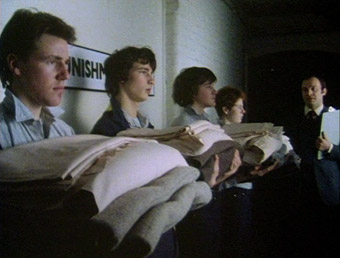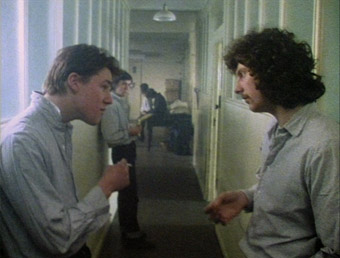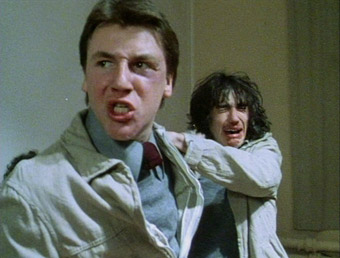|
This
review contains some major spoilers, so proceed with caution
if you are new to the film.
| |
"Along the fault line created by the banning of Scum flowed all the lousy decisions and abject behaviour which left the BBC ten years later having to fight to justify its very existence to government." |
| |
Writer/director David Hare at Alan Clarke's memorial service* |
The
story of what happened witb the TV version of Scum is well known in the British
film and TV industry. Written by Roy Minton and directed
by Alan Clarke, the project had been green-lit as
part of the prestigious Play for Today series
by BBC1 controller Brian Cowgill, but following his departure
and replacement with the more cautiously minded Billy
Cotton, problems arose. Cuts were requested, Home Office
and prison officials were called in to view it, and the
decision was ultimately made that the film should not be transmitted.
Despite having been already advertised, Scum was pulled from the schedules and remained a banned work
for the next fourteen years. Even then it only received
a single screening on rival station Channel 4, where it
was introduced by Made in Britain writer
David Leland (who memorably instructed us all to set our
video recorders going) as part of a season of programmes
paying tribute to Alan Clarke, who had died a year earlier.
Despite this sizeable initial setback, Clarke and Minton
refused to give up on the project, and two years later
re-shot the film on 35mm for a cinema
release. The resulting work became one
of the most successful British films of the year, and
one that to this day remains an powerful and iconic work.

Most
of those coming to the original version of Scum,
myself included, did so having already become familiar
with the feature film remake. This brings baggage to
the viewing that is unfair and unfortunate – in my case
the feature version was a key film of my youth, a work
that genuinely affected my attitude to cinema in general.
It was also my introduction to the work of Alan Clarke.
To fully appreciate the original's qualities it is important
to put that aside and to cart yourself back to the 1970s
and imagine just what would have happened if you had tuned
in at 9.25pm one evening and been presented, completely out
of the blue, with this. Had it not been banned, of course.
For
the uninitiated, Scum is set in a borstal,
a word that may mean little to younger viewers, the reason
being that the borstal system itself was abolished by
The Criminal Justice Act in 1982. Borstals were institutions
in which young offenders were incarcerated under a strict
regime of harsh discipline, work and education. They were
intended to teach their inmates respect for authority,
install in them a strong work ethic and build character.
By the 1970s, however, it was becoming clear that in a number of borstals
control was being maintained by a regime of violence,
bullying and racism being dished out
by staff and inmates alike. Into just such an institution
arrive three new unfortunates: tough, street-wise Carlin
has been transferred from another borstal after hitting
a warder; quiet, introverted Davis ran away from a minimum
security establishment; while black newcomer Angel is unprepared
for the racism he is to be subjected to by his
white custodians and fellow prisoners. Carlin in particular
becomes an immediate focus for attention, his reputation
as a 'daddy' – an inmate in an unofficial position of
power attained and maintained through a combination of violence and gangland-style intimidation
– having arrived ahead of him, which brings him into
immediate conflict with the warders and the incumbent daddy,
Pongo Banks.
The
original version of Scum is both more
low key and, in some ways, more hesitant than its later
feature film brother. Most of the performances lack the
striking confidence they have in the film and there
are none of the compellingly executed 'walking shots'
that were to become a trademark aspect of the director's
visual style. But this approach can also be seen as less
sensationalist than the film version, and creates an intimacy
with the characters that is immediately engaging and has
a matter-of-fact quality that in some ways enhances its potent air of realism.

The
narrative and dialogue are virtually identical to the feature, if lacking the expletives that are
now seen as key components of some of the film's most memorable
lines. Individual scenes sometimes unfold differently
here, and there are some locational shifts, but those familiar
with the feature will still feel at home. Where the two do
part company a little is in the second half – in this
version Carlin plays an increasingly minor narrative role,
and in a compelling scene that did not make it into the
film (due to Ray Winstone being uncomfortable with it, a decision he later regretted)
he takes on a 'missus', a young inmate he keeps around
for company and sexual gratification. This leads to a
scene also unique to this version in which the increasingly
despairing Davis goes to Carlin for advice, only to be dismissed
out of hand when he feels unable to talk in front of this
now ever-present companion. This paints Carlin in a more
callous light, making his own attitude a contributory
factor in Davis's eventual suicide and suggesting a
stronger motivation for him to lead the riot that follows,
springing as it does from his anger at himself for allowing
this to happen.
As
Carlin, Ray Winstone was making his acting debut here, and though he lacks the forceful authority he displays in
the remake, his obvious youth and naturalistic delivery
really sell the authenticity of his character and situation. This also applies to many of the
supporting roles, whose increased confidence in the feature resulted in part from being able to have a second shot at characters with which they were by then familiar, a chance almost every
actor must have wanted at one time or another. The character
that differs most noticeably in two films is without
doubt Archer, the cynical intellectual that Carlin befriends
and the mouthpiece for Roy Minton's own views on the situation.
Played to scene-stealing perfection by Mick Ford in the
remake, the interpretation here by David Threlfall is
less animated and lacking the cocky world-weariness
that Ford made central to his interpretation. Threlfall,
however, is just as fascinating in his own way and certainly
is less of a sore thumb standout in this particular
institution than his successor (Threlfall was to really prove
his worth five years later with his heart-breaking performance
as Smike in the Royal Shakespeare Company's production
of Nicholas Nickleby).
Initially
it's Carlin who drives the narrative, the beatings and
humiliation he endures leading to the inevitable but still
hugely cathartic scene in which he takes out Pongo and establishes himself as the new power on the
block. His position is consolidated when he defeats the intimidating black boss of B wing by swinging a weapon
in a fight his opponent was under the impression would
be settled with fists. It's in this scene, as in the
earlier one in which Angel is beaten by Pongo and then
given a nasty dressing-down by a warder, that the true nature
of the racist insults spouted many of the white characters
is most clearly illustrated – far from being an expression of genuine racial
hatred, it is used as yet another method of control, a
bullying put-down employed to belittle and humiliate. That
it is so direct will no doubt cause some newcomers to
the story to balk a little at these scenes, but it never
feels gratuitous, even at its most unpleasant.

As
the film builds, simmers and finally explodes, the viewer
is left with the inescapable sense of a system that does not strengthen
character nor install respect for authority, but which brutalises
and destroys, takes young men who have broken the rules
and moulds them into hardened criminals. If the TV original
never quite displays the electrifying power of the feature
version, then this is only right – the demands and expectations
of a cinema feature are different to that of a TV play,
and it's a sign of the screenplay's strength that no significant
changes had to be made to story, character or (toughening up aside) dialogue to reshape the film for cinema release.
As a work of its time, a TV play made for screening on
a mainstream TV channel, Scum is an astonishing
achievement. That it was banned and buried by the people
who should have been celebrating this is scandalous, but
that there is nothing being produced by any UK TV channel
now that comes even halfway close to matching the film's
boldness, ambition and commitment, is ultimately depressing.
Framed
in it's original TV ratio of 1.33:1, the film was shot on
location for UK TV in the 1970s on high speed 16mm stock.
The resulting grain is very noticeable throughout
and sharpness is occasionally a tad weak as a result, but
elsewhere reasonably crisp detail shines through the grain,
and given the limitations of the print Blue Underground have
done a most reasonable job on the transfer. Contrast is a
little high in places, but black levels are solid, and
it's frankly hard to see how the picture could have been significantly
improved. It's certainly several steps up from my VHS tape
print.
The
soundtrack is 2-channel mono, and given the age of the film
and the inerrant problems of filming in on location – sometimes
in wide shots where microphones needed to be hidden to be
effective – the quality and clarity of the sound is impressive
throughout. The film's sound recordist Michael Turner really
earned his money here.
Just
making this rarely seen but hugely important slice of British
TV history available on DVD would have been enough for me,
but Blue Underground have excelled themselves through the
inclusion of a commentary track featuring producer Margaret Matheson and actors David Threlfall
and Phil Daniels, the discussion being hosted by critic
and broadcaster Nigel Floyd, making it an all-English affair.
The first ten minutes consist of a general discussion on
how the project came into being, but the comments eventually
become screen-specific, with background detail supplied
on individual scenes and characters, and plenty of interesting
anecdotes thrown in about the production itself. David Threlfall
in particular appears to be having a good time. Later on,
Matheson gives some very detailed information on the banning
of the film, and all of the participants seem united in
their admiration of Clarke as a director and colleague. Consistently
engrossing and with no dead spots, this is a very fine,
very useful special feature.
A
second commentary track features
star Ray Winstone commenting on two short scenes, Carlin's
arrival at the borstal and the scene – not in the feature
version – in which he takes on a 'missus'. Winstone's comments
here are useful, especially his explanation over why the
scene failed to appear in the later version, though his
voice does sound as if it has been slowed down slightly,
giving it an unnaturally deep ring. The lack of a full commentary
by Winstone is not an issue, given his track on the cinema
version.
As
a stand-alone release this would have been exciting enough,
but as part of the Clarke box set it is a dream come true.
The transfer is as good as could be expected and the commentary
track is first rate. The inclusion of this original BBC version
of Scum in The
Alan Clarke Collection, together with
the equally rare Elephant,
makes it more than just an essential purchase for anyone who
really cares about Outsider Cinema – it marks it as probably
the most important box set be released this year, and possibly
the most electrifying collection of British film and television
material available on DVD.
*
Quoted in Alan Clarke, edited by Richard Kelly, first edition,
Faber and Faber 1998
|